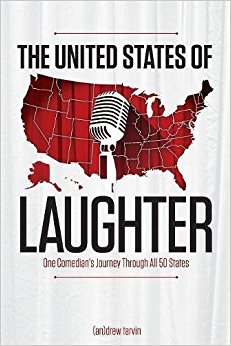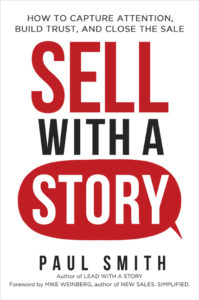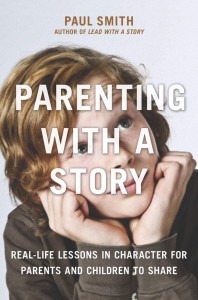Podcast: Play in new window | Download | Embed
Subscribe: RSS
Podcast (lead-with-a-story-podcast-series): Play in new window | Download | Embed
Subscribe: RSS

Professional comedian and self-described “humor engineer” Drew Tarvin recently completed a nomadic tour of the U.S. performing in all 50 States. His book The United States of Laughter: One Comedian’s Journey Through All 50 States details his funny, harrowing, and poignantly insightful experiences in each State.
I recently caught up with Drew and asked him to share his experience in the state of Florida where he did something on stage that he’d never done before. And it taught him a lesson about courage and risk-taking that I think all of us in leadership positions can learn from.
As always, it’s more fun to listen to Drew share the story himself, which you can do by clicking the play button above. If you’re short on time, below is an excerpt from that section of the book. Enjoy. . .
—
I stepped up to the microphone and looked out over the audience. Red Christmas lights hung from the ceiling with a sole spotlight illuminating my figure against a white backdrop. Audience members sat at small round tables in the middle of the space or on barstools along the side. My family sat in the back, making up some of the only white faces in the crowd.
We were at a slam poetry show, and most of the audience had turned up to see the incredibly talented Shelton Alexander aka “African American Shakespear” aka “Shake,” a poet based in New Orleans with a commanding voice and even more commanding control of the English language. But first, there were a few other poets doing readings, one of whom was me.
After my gun-shooting adventure in Louisiana, David and I had driven to Gulf Shores to meet up with family for an early summer vacation. While in the area, I was able to find a weekly poetry show at a vegan restaurant called Sluggo’s in nearby Pensacola that could count as my Florida performance. The only problem was, up until that point, I had never done any spoken word (save for a wedding reading I did at my cousin’s wedding a couple of years ago). But, when I inquired about the show, I mentioned I was a comic from New York City who also did spoken word, and they agreed to give me some time on the stage (clearly not fact checking any of my claims).
 I was grateful for the opportunity but also deeply nervous. Though I had done over 900 improv and stand-up shows at that point, every performance type is different. The expectations of a spoken word crowd are quite different than that of improv or stand-up. In improv, the audience knows you’re making things up on the spot, so the bar for laughter is lower since it’s created in the moment, just for them.
I was grateful for the opportunity but also deeply nervous. Though I had done over 900 improv and stand-up shows at that point, every performance type is different. The expectations of a spoken word crowd are quite different than that of improv or stand-up. In improv, the audience knows you’re making things up on the spot, so the bar for laughter is lower since it’s created in the moment, just for them.
Stand-up audiences tend to have higher expectations, sometimes to the point it feels like they’re thinking, “You think you’re funny? Prove it.” Spoken word audiences don’t care if you make them laugh, but they do want you to make them feel. Quite the challenge for an emotionally stunted robot.
As I approached the mic, the audience seemed to be thinking, “What is this white boy going to say?” I was wondering the same thing.
I introduced myself and started with my first bit, or I guess in poetry, what they call the first reading.
“Hello everyone, my name is Drew Tarvin, and with this performance, I will have performed in the thirteenth state of my tour.” There was a light round of applause.
“The First thing I’d like to start with is a dramatic reading of dumb jokes.” I cleared my throat and attempted to lower my voice to add some semblance of drama.
I saw a man smoking outside, so I went up to him and asked ‘Is that a cigarette you’re smoking?’ . . . He said, ‘Close, but no, cigar.’”
There was a long pause followed by polite laughter. I began to wonder if I was cut out for poetry. Maybe I was too far out of my element; maybe this was the limit of my performance abilities. But it was too late; there was nothing I could do but proceed to the next dumb joke.
I feel like windshield wiper fluid is the most gangsta part of the car . . . because it’s from the ’hood.”
This time there was a much louder reaction of laughter. I felt encouraged. I continued through a few more dumb jokes, some doing well and others leaving the crowd quiet.
I finished with my favorite joke.
I was at the airport when the man in front of me tried to control his child while checking into his fight. The flight agent asked: ‘Your son is quite unruly. Do you want to check him with your bags?’ The man replied, ‘Thanks, but I think I’ll carry on my wayward son.’”
A slow laugh spread across the room, not great but not bad. I transitioned into my second reading.
“For the next piece, I want to talk about something a little less dramatic: the meaning of life.” It was a piece I called “The Clichéd Meaning of Life.” I had written it for stand-up a long time ago but decided to dust it off, as it was the most spoken wordy thing I had ever worked on.
I made some substantial changes to it: tweaks to the flow, additional clichés, and a through line attempting to discover what matters most. It was a lot stronger than before, but I didn’t have the new version memorized, which meant I had to read it on my phone. This would be death at a stand-up club, but it was standard at a poetry show for newer poets.
The piece starts out with an introduction and then launches into one hundred clichés in four minutes, exploring the meaning of life. As I went through the poem, there were pauses for laughter, some head nodding, and I received my first “Mmh!” from the crowd.
It was the first time I had ever received that nonverbal but vocal confirmation, announcing that someone agreed with what I said on an emotional level. As a comedian, I definitely live for laughter, but that “mmh” and accompanying snaps were something I didn’t know I had been longing for. I finished the bit to loud applause and stepped off stage, getting an approving handshake from the host.
“That was Drew, uh . . . well, Drew, ladies and gentleman,” the host said as I walked off stage. I didn’t know this but a lot of poets use nicknames for their shows (a la “African American Shakespear”) and so the host was a bit surprised with the simplicity of my moniker.
I went to the back and sat with my family, receiving glowing reviews from all of them. As the other poets performed, I marveled at the energy of the room and emotion of their work. Some were incredible with wordplay, others with their commitment to performance; some weren’t very good at all. The audience was engaged and supportive of all of these artists revealing some of their deepest inner thoughts.
As the evening wound down and “Shake” left us mesmerized and inspired by his words, I reflected on the experience.
There’s something special about your first time doing anything—your first kiss, your first time driving a car, your first draft of a book detailing your travels to all the states. The first time is rarely perfect, but it is usually memorable. But too often we’re scared to try new things out of fear of being bad at them.
But if we only did things we knew we wouldn’t fail at, we’d all still be crawling around on our hands and knees because we fell down the first time we tried to walk. And getting past those first times is the only way to discover new passions, new hobbies, and new worlds.
I still had plenty more firsts to come on my trip: my first time eating rattlesnake (Colorado), my first time taking a helicopter ride (Arizona), and my first time touching a Ferrari (California). But that first poetry show was something surreal.
I never knew that, as an engineer, I would thoroughly enjoy such an emotionally driven art form. Perhaps I was drawn to it because it was so different. Or maybe I liked that they were accepting of wordplay and puns, so long as they were attached to a greater message. All I knew is that I had experienced a new culture and found a new interest thanks to my nomadic journey. This had been by first poetry show but it certainly wouldn’t be my last.
Now I just needed to come up with a good nickname. Drupac maybe? Drucifer? I got it: Winnie the Drew.
Use these links to subscribe to this podcast on iTunes or Stitcher, or Podbean.
You can find Drew at humorthatworks.com. Or connect with him on Twitter @DrewTarvin or Facebook.
—
 Paul Smith is one of the world’s leading experts on business storytelling. He’s a keynote speaker, storytelling coach, and bestselling author of the books Lead with a Story, Parenting with a Story, and Sell with a Story.
Paul Smith is one of the world’s leading experts on business storytelling. He’s a keynote speaker, storytelling coach, and bestselling author of the books Lead with a Story, Parenting with a Story, and Sell with a Story.


 Connect with him via email here.
Connect with him via email here.
Follow him on Facebook, LinkedIn, Twitter, and Instagram.
Sign up for his newsletter here to get one new story a week delivered to your inbox.

